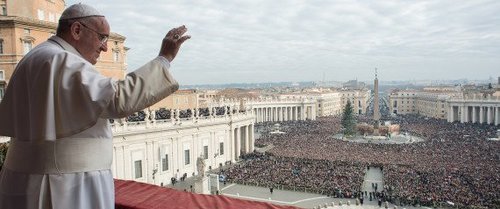


10/26/2015
Are Catholic truths immutable? Or can they change with the changing times?
This is the deeper question behind the issues that convulsed the three-week synod on the family of the 250 Catholic bishops in Rome that ended Saturday.
A year ago, German Cardinal Walter Kasper called on the church to change — to welcome homosexual couples, and to permit cohabiting and divorced and remarried Catholics to receive Communion.
Retorted traditionalists: This is heresy.
Had the pope followed his friend Cardinal Kasper and ordered Catholic teaching and diocesan practice changed, he could have provoked a schism inside the Church.
Such a change in doctrine would have called into question papal infallibility. Defined at the Vatican Council of 1869-70, that doctrine declares that when the pope teaches ex cathedra, on matters of faith and morals, he is protected from error by the Holy Ghost. Doctrinal truths, taught by popes in communion with the bishops, down through the ages, cannot change.
But if Catholic truths about the indissolubility of marriage and intrinsic immorality of homosexual unions can be changed, then, either the Church has been in grave error in the past, or the Church is toying with heresy today.
Saturday, The Washington Post described the synod as a "brawl over Francis' vision of inclusion."
Reporter Anthony Faiola compared the synod deliberations to a Tea Party rebellion in John Boehner’s House caucus, and the pope to a change agent like Barack Obama who finds himself blocked and frustrated by conservatives.
Saturday’s document from the synod ignored the call for a new Church stance toward homosexual unions. And it did not approve of giving Communion to divorced and remarried Catholics, whom the Church considers to be living in adultery.
Yet, in Sunday’s sermon the pope seemed angered by both the defiance of the resisting bishops and the conclusions the synod reached. To Pope Francis, the traditionalists appear to be placing the strictures of moral law above the Gospel command of mercy.
"None of the disciples stopped, as Jesus did" said Francis of the blind man. "If Bartimaeus was blind, they were deaf. His problem was not their problem.
"This can be a danger to us. … A faith that does not know how to grow roots into the lives of people remains arid and, rather than oases, creates other deserts."
The pope seems to be saying that the dissenting bishops, no matter their command of moral law, are lacking in charity, the greatest of the three theological virtues.
Where does the bishops' synod on the family leave the Church?
In confusion, and at risk of going the way of the Protestant churches that continue to hemorrhage congregants.
Recall. With its acceptance of birth control at the Lambeth conference of 1930, the Church of England started down this road, as did its sister, the Episcopal Church. The process led to the decline of both.
From birth control, to divorce and remarriage, women priests, gay clergy, homosexual bishops, same-sex marriage, the Episcopal Church first broke apart, and now appears to be going gentle into that good night.
Indeed the Church of England began in schism, when Henry VIII broke with Rome after Pope Clement VII refused to approve his divorce from Catherine of Aragon and his marriage to Anne Boleyn. According to Cardinal Kasper, Clement should have cut Henry some slack.
In this battle between traditionalists in the synod and the bishops who favor acceptance of some or all of Kasper’s recommendations, the pope seems to stand squarely on the side of the reformers.
Yet, it was the Protestant Reformation that destroyed the unity of Catholicism, five centuries ago, as it divided nations and led to conflicts of religion and nationalism, such as the Thirty Years War.
How the Catholic Church can avoid greater confusion among the faithful — after the pope’s virtual blessing of the Kasper recommendations, and the synod’s rejection of them — escapes me.
What does the pope do now?
If he ignores the synod’s dissent and moves the Church toward the Kasper position, he could cause a traditionalist break, a schism. Third World bishops might well refuse to change.
If he does nothing, he will disappoint Western bishops, priests and secularists who have seen in his papacy hope for an historic change in Catholic teaching and practice.
If he permits the bishops to follow their consciences in their dioceses, he will advance the disintegration of the Church.
The inevitable result of any of these courses that the pope chooses will be, it seems, to deepen the confusion of the faithful.
As for Pope Francis himself, he, too, must choose.
He can emulate Cardinal Wolsey — or Thomas More.
Patrick J. Buchanan needs no introduction to VDARE.com readers; his books State of Emergency: The Third World Invasion and Conquest of America, and Suicide of a Superpower: Will America Survive to 2025? are available from Amazon.com. Patrick J. Buchanan is the author of the new book “The Greatest Comeback: How Richard Nixon Rose From Defeat to Create the New Majority.